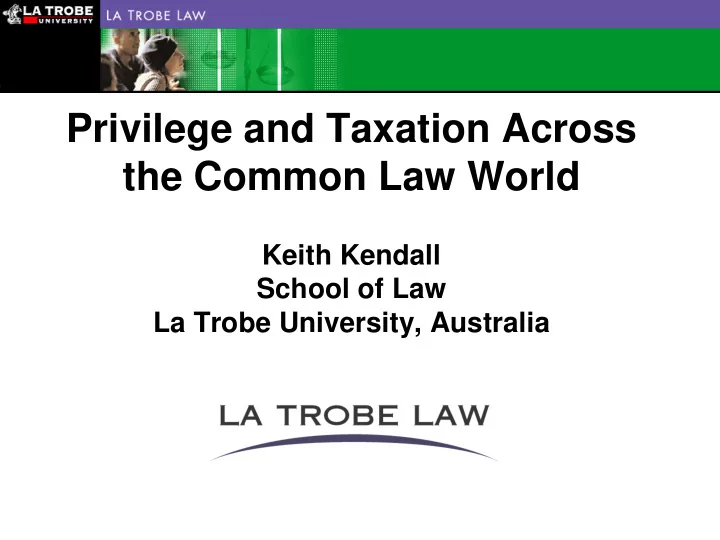

Privilege and Taxation Across the Common Law World Keith Kendall School of Law La Trobe University, Australia
Overview • Introduction • United Kingdom – Ineffective extension • Canada – No extension • New Zealand – Separate statutory privilege • United States – Statutory common law extension
Introduction • Taxation advice provided by various professionals – Lawyers – Accountants (increasing/majority) – Financial planners (including estate planners) – Actuaries • Revenue authorities generally given wide powers of investigation
Introduction • General principle – advice from lawyer privileged • Tension 1: Reconciliation with investigation powers • Tension 2: Privilege extend to non-lawyer advisers? – If so, how far?
United Kingdom • Starting point for all common law systems – Includes United States • 2 heads of privilege – Advice – Litigation • Focus on advice – Relevant for non-lawyers • Advice privilege – must involve lawyer
United Kingdom • Privilege is absolute – Prudential (Court of Appeal) (2010) • Substantive right/not mere rule of evidence – Promotes administration of justice – Trust and confidence • R v Derby Magistrates Court Ex p B (1996) – Note overtones of Grant v Downs
United Kingdom • HMRC information powers – Secs 19 to 20A Taxes Management Act 1970 – (Now) Schedule 36 Finance Act 2008 • Overridden by LPP – Morgan Grenfell (2002) – See [23] Sch 36 FA • No privilege for tax accountants – Chantrey Martin (1953)
United Kingdom • Surface statutory extension to tax advisers – Sec 20B(9) TMA – [25] Sch 36 FA • Substantially diluted – [26] Sch 36 FA • Tends not to be raised in litigation • Chantrey Martin being relitigated – Prudential (Supreme Court) – Nov 2012 (hearing)
United Kingdom • Interaction with European Convention on Human Rights – Art 8 – advice privilege (respect for privacy) • Qualified right – Prudential (CoA) • Being consider by Supreme Court
Canada • LPP = solicitor-client privilege (SCP) – Based on early UK authorities • Primary principles – Solosky v R (1980) – Descôteaux v Mierzwinski (1982) • Investigation powers – Secs 231.1 and 231.2 Income Tax Act 1985
Canada • SCP override – Sec 232 ITA • No extension for non-lawyers – Inc accountants
New Zealand • LPP based on received English law – Involvement of lawyer critical • Investigative powers – Primarily ss 16 to 19 Taxation Administration Act 1994 • Investigative powers subject to LPP – West-Walker (1954) • Seminal common law case – Now legislated in s 20 TAA 1994
New Zealand • Non-disclosure right (NDR) – Secs 20B to 20G TAA 1994 • Separate statutory privilege – Independent of common law • Blakeley (NZHC) • Adviser must be member of approved adviser group – ICANZ, TaxAgents’ Institute of New Zealand • Applies to tax advice documents
New Zealand • NDR more limited than common law – Procedure for assertion – Time limited (substitute for waiver) – No protection for tax contextual information – Applies only to books and documents • Not “information” – Term used elsewhere, inc ss 16-19 – Doesn’t apply to tax debt collection provisions
United States • LPP = attorney client privilege (ACP)/work product doctrine (WPD) – ACP = advice privilege – WPD = litigation privilege • Same justifications as other common law jurisdictions – Early UK cases often cited • Very similar structure – Irrelevant differences – Lawyer involvement critical
United States • IRS investigatory powers – IRC s 7602 • Subject to ACP and WPD – Upjohn (ACP) – Adlman (WPD) • No accountant-client privilege – Couch
United States • Extension for Federally Authorized Tax Practitioners – IRC s 7525 • FATP includes – CPAs, agents, actuaries, retirement planners • Applies only to tax advice • Incorporates common law ACP
United States • More limited than common law – Exclusion for tax shelters – Compulsory waiver • Compulsory disclosure to other agency = waiver – No application to criminal proceedings – Applies only to federal taxes in federal courts • Some states have some protection
Recommend
More recommend